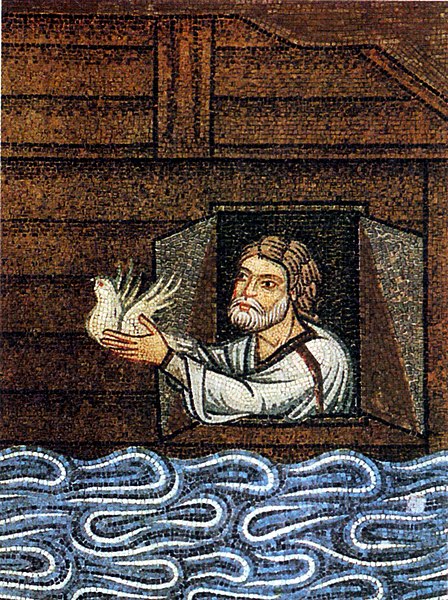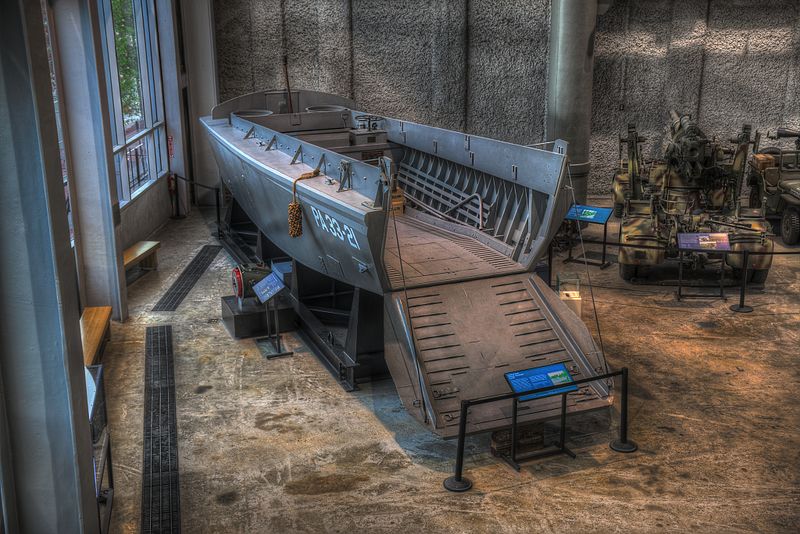
The path the new life often lies through deep waters.
Yesterday (June 6) was the anniversary of the D-Day invasion in 1944, the World War 2 operation that opened up the Western front in the European theater and began the Allied assault on Hitler’s Fortress Europe. I also happened to preach on Noah and the flood yesterday.
Both stories center on boats crossing stormy seas, both involve people called to a duty larger than themselves, and both involve the hope of a bright future on the other side of the seas. In reflecting on these two water-born missions, we also see something about the nature of the church.
Through the Deep
For Noah, the path to the new world was over the waters. Forty days of rain flooded the earth, and all he and his family and his overgrown life raft could do was endure.
For the men of D-Day, the only way to victory, the way to ensure the beginning of the end of the Axis war machine, was over the water. The English Channel was perilous: choppy, unpredictable, and violent. But it was the only way.
In the Bible, water is a sign of chaos. This is why, in Revelation 21, John’s vision of the Kingdom includes the line, “and the sea was no more.” In the end, God overcomes the chaos of the world, life overcomes death, the light swallows up the darkness. But the way to new life is through the chaotic deep. Every time the church baptizes someone, we re-enact this dynamic. As St. Paul tells us, we are united in Christ’s death (ritually drowned, taken down into the death) and resurrection (brought up to new life out of the water).
Called
Noah was called to an unimaginable task. The world was about to be undone, remade, and rebooted. His task? Build a boat. Gather animals. Convince your family to get in. How strange.
The soldiers of D-Day were also called to something unimaginable: a full front assault against occupied France, a cross-Channel invasion that was without precedent in the modern world.
A classic hymn, “How Firm a Foundation,” reminds us that God’s call never comes without the promise of God’s sustaining presence:
When through the deep waters I call thee to go,
The rivers of sorrow shall not overflow;
For I will be with thee, thy troubles to bless,
And sanctify to thee thy deepest distress.
The calling of God is often to tasks beyond our dreams and our abilities. Why would God call us to something that was easy? God’s calling is not only to do more than we had imagined, but to be more than we thought we could be. But the Lord does not call without equipping. We can only be equal to tasks larger than us by the grace of God, which is always bountiful.
Hope
The ark that Noah constructed contained the seed of hope for a renewed creation. Despite God’s wrath, the judgment of the world was not final. In God’s grace, a new covenant was forged from the destruction, a fresh beginning for creation.

Swamp boats held the key to Allied hopes on D-Day. Manufactured in New Orleans, the “Higgins Boats” that carried the bulk of soldiers from their ships to the shores of Normandy were the beginning of the end of the Third Reich. A desperate ploy, some thought, but one considered worth the risk.
We, too, hope for a new creation. We, too, seek refuge in the ark of God known as the church. It is the church, this ship on temptest-tossed seas, in which we are sustained on the journey toward the Kingdom. This ark holds the beauty of God’s promise and awaits the dawning of a new day.
An Ark, Not a Cruise Ship
In my sermon yesterday I concluded with an analogy I heard long ago, though I forgot the source. The image of a ship has long been a symbol of the church. Richard Heitzenrater, a (now retired) leading Methodist historian, designed a logo for Duke Divinity School with this in mind.
But if the church is a ship, what kind is she?
For too many, the church is a cruise sheep: a place of comfort only, a place of entertainment, a place to disengage from the world and simply “get fed.”
But the church is much more like an ark: a gathering (ideally) as diverse as creation itself, a collection of creatures called together to cross the chaos of the world in the hope of a new creation.
On the cruise ship, you sip champagne and eat lobster. On the ark, we break bread and lift up the sanctified cup, prayerfully endure through the deep waters, and plot to take part in God’s New Creation.